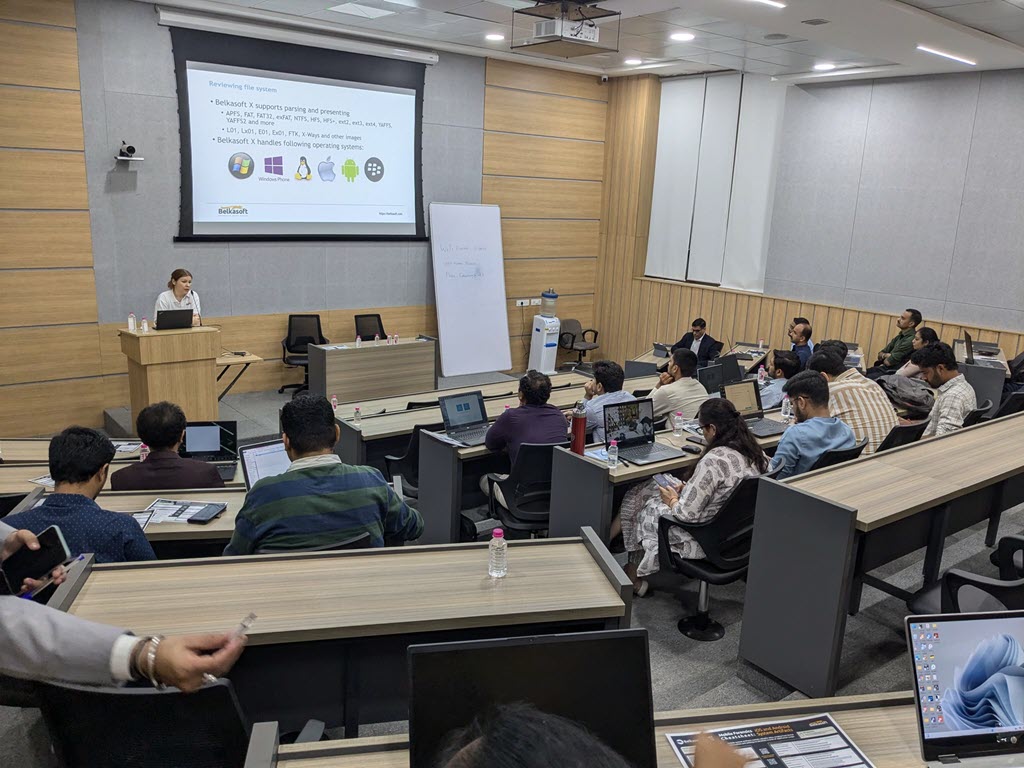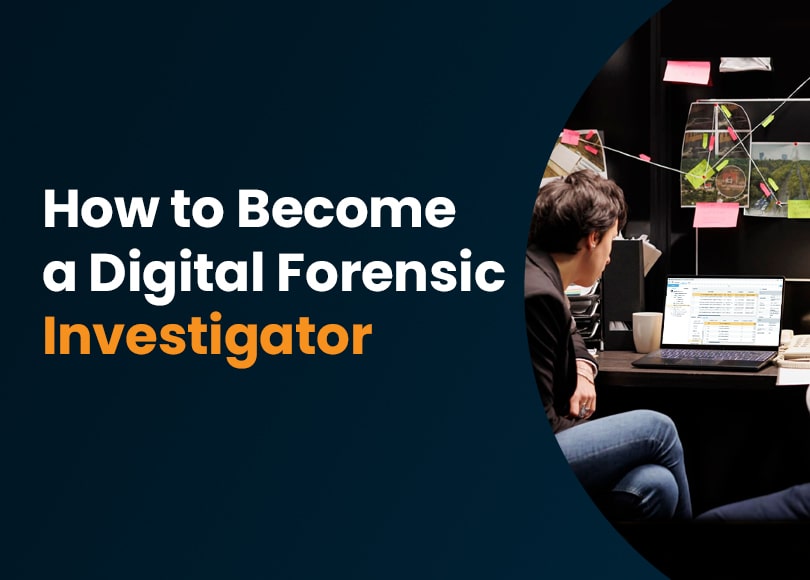How to Become a Digital Forensic Investigator
The field of digital forensics is an exciting and rapidly evolving domain. As cybercrime escalates and technology advances, the role of a digital forensic investigator becomes ever more critical. These professionals, often referred to as digital detectives, uncover, analyze, and preserve digital evidence to aid in solving crimes or addressing cybersecurity incidents. If you have ever wondered how to break into this fascinating field, you are in the right place. Let us explore the skills, education, and career paths that define this profession.
Here is what we will cover:
- Digital forensics: A brief overview
- Is digital forensics the career for you?
- The education pathway
- Building essential skills
- Challenges in the field
- The growing demand for digital forensics
- Final thoughts: Starting your journey
Digital forensics: A brief overview
At its core, digital forensics focuses on identifying, collecting, and analyzing digital evidence. This could range from recovering deleted files on a computer to uncovering incriminating text messages on a mobile device. While the overarching term Digital Forensics Investigator is widely used, professionals in the field may hold a variety of titles, including:
- Digital Forensics Analyst
- Computer Investigator
- Cyber Forensic Investigator
These roles share overlapping responsibilities but can differ based on the specific job environment, whether in law enforcement, corporate cybersecurity, or private consulting.
Let us look into the duties specific to each of these environments.

Law enforcement
Working in law enforcement as a cyber forensic investigator often involves analyzing evidence for criminal cases, which means gathering, examining, and preserving evidence from digital sources in a way that ensures it holds up in court. These roles may be occupied by sworn officers or civilian specialists. The typical duties of digital forensic investigators in law enforcement are:
- Evidence Collection and Preservation: Secure digital evidence from various devices, ensuring integrity and adherence to legal standards.
- Data Recovery: Retrieve deleted or encrypted files to support criminal investigations.
- Analysis and Reporting: Examine digital evidence to reconstruct events, prepare detailed reports, and present findings in court.
- Collaboration: Work alongside law enforcement officers, attorneys, and other stakeholders during investigations.
- Expert Testimony: Serve as an expert witness, explaining technical findings to judges and juries.
Private sector
In the corporate world, digital forensics professionals investigate incidents like data breaches, intellectual property theft, or employee misconduct. These roles, often titled digital forensics engineer or consultant, provide opportunities to work on diverse cases ranging from cyberattacks to internal compliance investigations. Some of the core responsibilities of a cyber forensic investigator in the private sector are:
- Incident Response: Investigate cybersecurity breaches to determine origin, method, and impact.
- Forensic Analysis: Analyze compromised systems to identify malicious activities and potential data exfiltration.
- Reporting: Document findings and provide recommendations to enhance organizational security measures.
- Compliance Assurance: Ensure that digital investigations align with legal and regulatory standards.
- Training and Awareness: Educate staff on cybersecurity best practices and emerging threats.
eDiscovery specialists in legal support
eDiscovery specialists assist legal advisers by managing the identification, collection, analysis, and presentation of digital evidence. These professionals specialize in uncovering electronic data that may support a case, whether in defense or prosecution.
Their responsibilities usually include:
- Data handling: Identify, preserve, collect, process, review, and present electronic data in a legally defensible manner.
- Collaboration: Work with IT and legal teams to develop strategies for efficient ESI retrieval.
- Data integrity: Ensure all data is preserved in its original form for court admissibility.
- Project management: Prepare and implement e-discovery plans, including timelines, budgets, and resource allocation.
- Data mapping: Create maps to locate and manage stored company data, especially for data recovery cases.
- Training and support: Educate legal teams and staff on e-discovery tools and best practices.
Specialized roles
Forensic roles can also extend into niche areas such as:
- Computer forensics: Analysing data from Windows, Mac, and Linux-based computers
- Mobile forensics: Examining smartphones and mobile devices.
- Cloud forensics: Investigating data stored in cloud environments.
- Malware analysis: Identifying and understanding cyber threats to mitigate their effects.

Is digital forensics the career for you?
Before diving into this career path, consider the following:
- Are you detail-oriented and curious by nature?
- Do you have an aptitude for technology and problem-solving?
- Can you handle the emotional toll of possibly analyzing disturbing content and the pressure of knowing your work could significantly impact someone's life, such as determining guilt or innocence in a legal case?
Successful digital forensic professionals combine technical expertise with an investigative mindset. Beyond technical skills, they must also excel in communicating their findings, often presenting evidence in court to a non-technical audience.
The education pathway
While there is no single route to becoming a digital forensic investigator, a solid foundation in education is crucial. Most professionals start with:
1. A degree in a related field
- Popular choices include computer science, cybersecurity, and information technology. Specialized degrees in digital forensics are also available.
- Alternatively, degrees in criminal justice, law enforcement, or criminology can provide a unique perspective on investigations.
2. Certifications to boost credibility
Obtaining a higher education degree in computer forensics is highly advantageous. Studies indicate that professionals with a degree often earn nearly twice as much as those relying solely on certifications.
Employers typically prioritize candidates with a bachelor's degree in fields such as forensic science, computer science, criminal justice, or related disciplines. Combining a degree with certifications can significantly enhance your appeal to potential employers, helping you stand out in a competitive job market.
That said, there are still ample opportunities for those who hold only forensic certifications, particularly within law enforcement roles. If you are considering advancing your education or obtaining specialized credentials, exploring post-secondary programs and certifications can be an excellent step forward in your digital forensics career.
Other recognized certifications in the field include:
- Certified Forensic Computer Examiner (CFCE)
- GIAC Certified Forensic Analyst (GCFA)
Digital forensics tool vendors also offer free and affordable training that helps with mastering skills in specific areas like mobile forensics or corporate investigations. For example, Belkasoft offers a number of self-paced courses that not only provide in-depth knowledge of data structures and analysis techniques but also include an extensive set of practical tasks.
In certain countries or organizations, digital forensic investigators are also required to complete training specific to the tools they use in investigations. Certifications tied to specific forensic tools, such as the BelkaCE from Belkasoft, are a prime example. These certifications not only validate expertise but also authorize professionals to utilize the tools effectively in official investigations, bolstering the credibility and reliability of their findings.

3. Hands-on experience
Educational qualifications are often paired with internships or entry-level roles in law enforcement agencies, corporate IT teams, or consulting firms. Gaining practical experience helps bridge the gap between theory and real-world applications.
Another excellent way to improve is through Capture the Flag (CTF) competitions. These events simulate real-life scenarios, challenging participants to solve complex digital forensics and cybersecurity cases in tight timeframes. CTFs are invaluable for developing technical expertise, fostering problem-solving skills, and gaining insights into industry tools and methodologies. For instance, the Belkasoft CTF provides participants with opportunities to tackle forensic challenges and enhance their practical knowledge in a competitive environment.
Building essential skills
Digital forensics requires a diverse skill set. Aspiring investigators should focus on developing the following skill set:
- Evidence preservation skills: Learn how to collect and preserve evidence without altering it and follow chain-of-custody protocols.
- Technical expertise: Master digital forensic software. Understand device acquisition techniques and their limitations, file systems, data structures, and decryption methods.
- Investigative skills: Develop techniques for uncovering and analyzing data related to a case and piecing together timelines from digital breadcrumbs.
- Communication abilities: Craft clear and concise reports. Hone your ability to present technical findings to non-technical audiences, including judges and juries.
- Legal acumen: Understand the legal frameworks surrounding digital evidence. This includes privacy laws and the admissibility of evidence.
A strong foundation in these areas not only makes you a better investigator but also boosts your confidence when testifying in court or presenting findings to stakeholders.
Challenges in the field
The field of digital forensics is not without its hurdles. Professionals must navigate several key challenges:
Rapidly evolving technology: With encryption and cybersecurity defenses improving, accessing and analyzing data becomes increasingly complex. Mobile devices, in particular, pose unique challenges due to advanced encryption and privacy protections. Even with a password, examiners might only have partial visibility of the data without the ability to extract it in a legally admissible way. Local laws around encryption and privacy can further complicate the recovery process.
Legal and ethical boundaries: Forensic work often straddles sensitive ethical lines. Understanding what is permissible under the law is critical, as even a single misstep can compromise evidence, rendering it inadmissible in court.
Going back to the example mentioned above, in certain jurisdictions, compelling a suspect to share their password could render the evidence inadmissible, while other regions might enforce compliance through penalties. Some suspects also employ deceptive tactics, such as revealing one password while hiding incriminating data within a separate encrypted container.
To navigate these complexities, digital forensic investigators must possess a strong command of encryption technologies, a clear understanding of legal boundaries, and expertise in using forensic software tools effectively.
High stakes: A forensic investigator's work often determines the outcome of cases ranging from serious crimes such as murder and abduction to corporate investigations involving fraud or intellectual property theft. Attention to detail is paramount, as errors can have significant legal repercussions.
Staying up-to-date with advancements in technology and methodology is essential. Many professionals find value in engaging with resources like DFIR blogs or industry conferences to refine their skills and knowledge. Events such as the recent BelkaDay Asia Conference, organized by Belkasoft, bring together industry leaders, digital forensic investigators, incident responders, law enforcement professionals, and technology enthusiasts to share knowledge, exchange ideas, and collaborate on advancing the field. Recordings of the event are available for those who wish to explore its valuable insights.

The growing demand for digital forensics
A digital forensic investigator's salary varies based on factors like education, experience, and location. As cyber threats become more sophisticated, the demand for skilled digital forensic professionals is skyrocketing. According to a 2023 report, the global digital forensics market is expected to reach $10.9 billion by 2028, growing at a compound annual rate of 9.9%. This growth underscores the expanding opportunities in this field.
Final thoughts: Starting your journey
Becoming a digital forensic investigator requires a blend of education, practical experience, and a passion for uncovering the truth.
Earning a degree in forensic science or a related field lays the foundation for success in this domain. Certifications, on the other hand, delve deeper into specific tools and methodologies, enhancing a professional's credibility in the courtroom.
To thrive in this field, it is not only crucial to master technical and investigative skills but also to develop the ability to clearly communicate your findings. After all, your audience—whether a judge, jury, or investigator—will rely on your ability to articulate complex evidence in a way that is both accurate and accessible.
Whether you are analyzing a computer system, tracing the source of a cyberattack, or testifying in court, this career offers challenges and rewards in equal measure.
Start your journey today by exploring degree programs, earning certifications, and gaining hands-on experience. With determination and a commitment to continuous learning, you will find yourself at the forefront of one of the most dynamic and impactful fields in technology.
Interested in diving deeper into specific tools or techniques in digital forensics? Check out Belkasoft's resources on DFIR.
